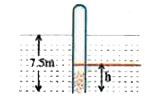The densities of a liquid at 0∘C and 100∘C are respectively 1.0127 and 1. A specific gravity bottle is filled with 300 g of the liquid at 0∘C upto the brim and it is heated to 100∘C. Then, the mass of the liquid expelled in gram is
Coefficient of linear expansion of glass =9×10−6/∘C)Solution in Telugu
dt=d01+γt⇒1+γt=d0dt=1.018⇒γt=0.018⇒γ=0.018100=0.00018per∘C
γapp=0.000180−0.000027=0.000153⇒−000153=x(340−x)×1000
x=0.0153(340−x)⇒1.0153x=340×0.0153⇒x=340×0.01531.0153=5.126gm
Topper's Solved these Questions
- EXPANSION OF LIQUIDS BOOK - AAKASH SERIESCHAPTER - EXPANSION OF LIQUIDS EXERCISE - TEST YOUR SELF
5 Videos
- EXPANSION OF LIQUIDS BOOK - AAKASH SERIESCHAPTER - EXPANSION OF LIQUIDS EXERCISE - VERY SHORY ANSWER TYPE QUESTIONS
15 Videos
- EXPANSION OF GASESBOOK - AAKASH SERIESCHAPTER - EXPANSION OF GASESEXERCISE - QUESTIONS FOR DESCRIPTIVE ANSWERS
4 Videos
- EXPANSION OF SOLIDS BOOK - AAKASH SERIESCHAPTER - EXPANSION OF SOLIDS EXERCISE - Questions for Descriptive Answers
5 Videos
Similar Questions
Is the real coefficient of expansion of water between 0∘Cand4∘C positive or negative? Explain.
View SolutionWhy the expansions of the liquids is greater than the expansion of the solids ?
View SolutionA thin uniform tube of length 9 m closed at one end is immersed in water to a depth of 7.5 m. Find the height h to which water rises in the tube. Ignore any temperature change and take atmosphere pressure as 10 mg water column.

View SolutionThe length of an iron rod is measured by a brass scale. When both of them are at 20∘C, the length is 80 cm. What is the length of the rod at 100∘C as measured by the scale at 100∘C? The coefficient of linear expansion of brass and iron are 24×10−6(C∘)−1and18×10−6(C∘)−1 respectively.
View SolutionIf on heating liquid through 80∘C, the mass expelled is (1100)thof mass still remaining , the coefficient of apparent expansion of liquid is
View SolutionThe density of a liquid at 100∘C is 8.0g/cm3 and at 0∘C is 8.4g/cm3, the coefficient of cubical expansion of the liquid is
View SolutionA weight thermometer contains 52g of liquid at 100C. When it is heated to 1100C,2g of the liquid is expelled. The coefficient of real expansion of the liquid is [αgIis9×10−6/0C]
View SolutionA glass vessel just holds 50gm of a liquid at 0^(0)C . If the coefficient of linear expansion is 8 xx 10^(-6) // ^(0)C The mass of the liquid it holds at 80^(0)C is [coefficient of absolute expansion of liquid = 5 xx 10(-4) //^(0)C (nearly)
View SolutionThe densities of a liquid at 0^(@)C and 100^(@)C are respectively 1.0127 and 1. A specific gravity bottle is filled with 300 g of the liquid at 0^(@)C upto the brim and it is heated to 100^(@)C . Then, the mass of the liquid expelled in gram is Coefficient of linear expansion of glass = 9 xx 10^(-6)//^(@)C )
View SolutionIf on heating liquid through 80^(@)C , the mass expelled is (1/100)^(th) of mass still remaining , the coefficient of apparent expansion of liquid is
View SolutionWhen a liquid in a glass vessel is heated its apparent expansion is 10.30 xx 10^-4 //^@C same liquid when heated in a metal its apparent expansion 10.06 xx10^-4//^@C . The coefficient of linear expansion of the metal is (Coefficient of linear expansion of glass = 9 xx 10^-6 //^@C )
View SolutionA specific gravity bottle is completely filled with mass m of a liquid at 0∘C. If it is heated to t∘C, then what mass of the liquid will be expelled? Coefficient of real expansion of the liquid =γ and coefficient of linear expansion of the material of the bottle =α.
View SolutionA bottle contains 82 gm of liquid of 10∘C. When it is heated to 35∘C, 2 gm of liquid is expelled. Calculate the apparent coefficient of expansion of liquid.
View SolutionCalculate the coefficient of real expansion from the following data.
Weight of the specific gravity bottle = 40.25 gm , Weight of the bottle + liquid at 25∘C=70.50gm Weight of the bottle + liquid at 100∘C69.20gm : Coefficient of linear expansion of glass = 0.000009/∘C
View SolutionA specific gravity bottle weighs 20.5 gm when it is empty. When it is filled with a liquid at 20^(@)C it weighs 45.2 gm. The bottle with the liquid at 100^(@)C weighs 43.2 gm. Calculate the coefficient of apparent expansion of the liquid.
View Solution
